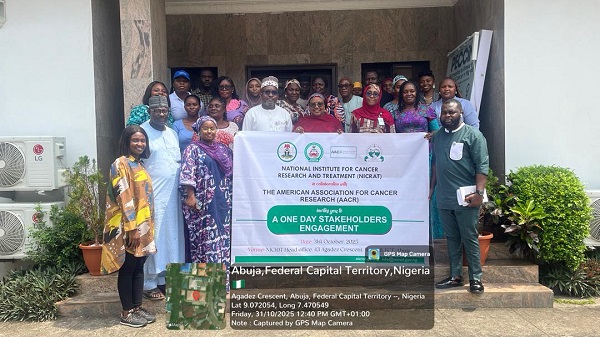Copyright thenationonlineng

The National Institute for Cancer Research and Treatment (NICRAT) has announced new community-based strategies to strengthen cancer prevention, awareness, and early treatment across Nigeria. The Director-General (DG) of NICRAT, Prof. Usman Aliyu, disclosed this during a one-day Stakeholder Engagement Meeting for the NICRAT–American Association for Cancer Research (AACR) Awareness, Prevention and Treatment (APT) Campaign Project held in Abuja over the weekend. The initiative, jointly implemented by NICRAT and AACR, aims to improve cancer prevention and early detection by promoting multi-level community engagement and integrating these services into Nigeria’s health system. Represented by the Director of Cancer Prevention and Control, Dr Usman Waziri, the DG said the APT Campaign Project was designed to support Nigeria’s cancer control agenda by enhancing public awareness, improving access to screening, and embedding preventive services within primary healthcare structures. “The project is designed to leverage evidence-based strategies and local expertise to build sustainable cancer prevention models across the Federal Capital Territory and, ultimately, nationwide. “Our goal is to harmonize efforts to ensure the success of the APT Campaign. This collective process embodies the very essence of integrated cancer control: shared responsibility, mutual accountability, and evidence-led action,” Aliyu noted. He commended the Federal Ministry of Health and Social Welfare under its current leadership for providing the policy guidance that enables such partnerships to thrive, while lauding the AACR for its commitment to advancing cancer research and capacity development in Nigeria. In her remarks, the Executive Secretary of the FCT Primary Healthcare Board, Dr Rukkaiya Wammako, expressed concern about the low level of cancer awareness in local communities and called for intensified grassroots sensitization. Read Also: Cancer control: FG directs NICRAT to decentralise operations She emphasized that communication in local languages was vital to changing perceptions and overcoming denial about the disease. “There is a need to constantly engage local communities to ensure attitudinal change. Denial remains a major barrier,” she said. Wammako reiterated that cancer is curable if detected and treated early and urged residents of the FCT to embrace the HPV vaccine to protect young girls from cervical cancer. She commended NICRAT for leading the initiative, assuring that the FCT Administration would continue to partner with the Institute to strengthen health interventions for the benefit of all residents.



